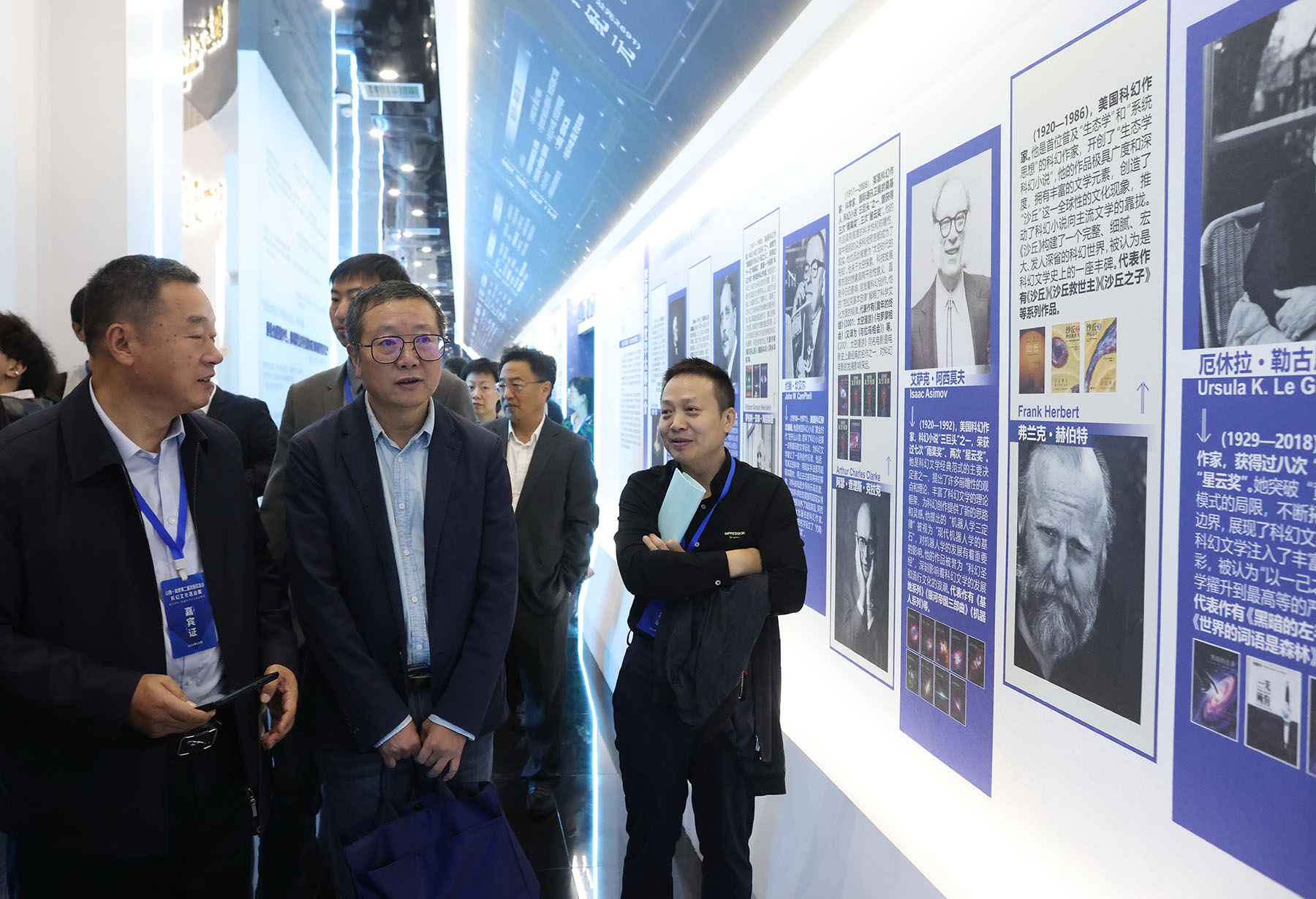
China launched its first literary museum dedicated to Liu Cixin, a renowned science fiction writer and Hugo Award winning novelist, in Yangquan, Shanxi province, on Sunday.
While accepting the nation's honor and unveiling the Liu Cixin Sci-fi Museum, Liu, author of the acclaimed sci-fi novel trilogy The Three-Body Problem who grew up in Yangquan, said that he hopes the museum can help the general public gain a better understanding of the sci-fi literature and develop an interest in the genre.
READ MORE: Chinese sci-fi masterpiece gains huge fan base overseas
Located at a cultural park, the 700-square-meter museum educates visitors about Liu's growth, his books and awards, and cultural and creative products derived from his works. Immersive projectors also create an atmosphere mimicking interstellar voyages described in Liu's novels.
Born in 1963, Liu wrote novels that gained fame in the late 1990s and early 2000s, with works including The Village Teacher and The Wandering Earth.
The first volume of The Three-Body Problem was first serialized in a magazine in 2006 and eventually won Liu the Hugo Award — the top prize in sci-fi novels — for Best Novel in 2015, making him the first Asian writer to receive the honor. The second volume was published in 2008, and the third in 2010.
Altogether, the trilogy has sold more than 30 million copies, according to Zhao Jilong, head of The Three-Body Universe, which operates the franchise commercially. Zhao said the trilogy has been translated into 35 languages worldwide.
Multiple adaptations of Liu's novels have hit the screen over the years, including the English-language 3 Body Problem TV series by Netflix this year and Three-Body by Tencent and China Central Television last year. In addition, the movie The Wandering Earth in 2019, adapted from Liu's novel, garnered nearly 4.7 billion yuan ($660 million) at the box office.
China's sci-fi market has also boomed following the popularity. An industry report released in April showed that the domestic market hit 113 billion yuan last year, up 29 percent year-on-year. At the 82nd World Science Fiction Convention, or Worldcon, which was held in August in Glasgow, Scotland, a record nine works by Chinese sci-fi authors were nominated for a Hugo Award.
Despite his success, Liu said that overall, Chinese sci-fi literature is not yet prosperous and still needs development, adding that the popularity of The Three-Body Problem trilogy was somewhat "by chance".
He said he hopes sci-fi can bring readers more joy, so they can "touch the sky with their imagination and embrace the future". However, fans may have to wait longer if they want to see something new from him.
"I've been trying to write, but currently it's very difficult," Liu said. "I would only bring out a new work that is of good quality."
Yan Jingming, vice-president of the China Writers Association, said that the establishment of the museum is not only an homage to Liu and his works but also serves as a beacon for China's sci-fi writers and fans.
ALSO READ: 'The Three-Body Problem' expected to see mega-budget film adaptation
He said he hopes it will bring like-minded sci-fi novelists together and spark more inspiration and works.
The launch was part of a weeklong sci-fi promotional event in Yangquan that also included a symposium on sci-fi literature and real-world productivity, where Liu shared his thoughts on potential immigration to Mars.
"I would love to go to Mars if it were a round trip," Liu said, explaining that a one-way journey would not suit him as he had work to do and family members to be with on Earth.
Nevertheless, Liu said he admires Elon Musk, who has developed plans for Mars immigration.
"He's like a person jumping out of sci-fi novels," Liu said. "He has turned a lot of things from books to reality."
Contact the writers at liangshuang@chinadaily.com.cn


